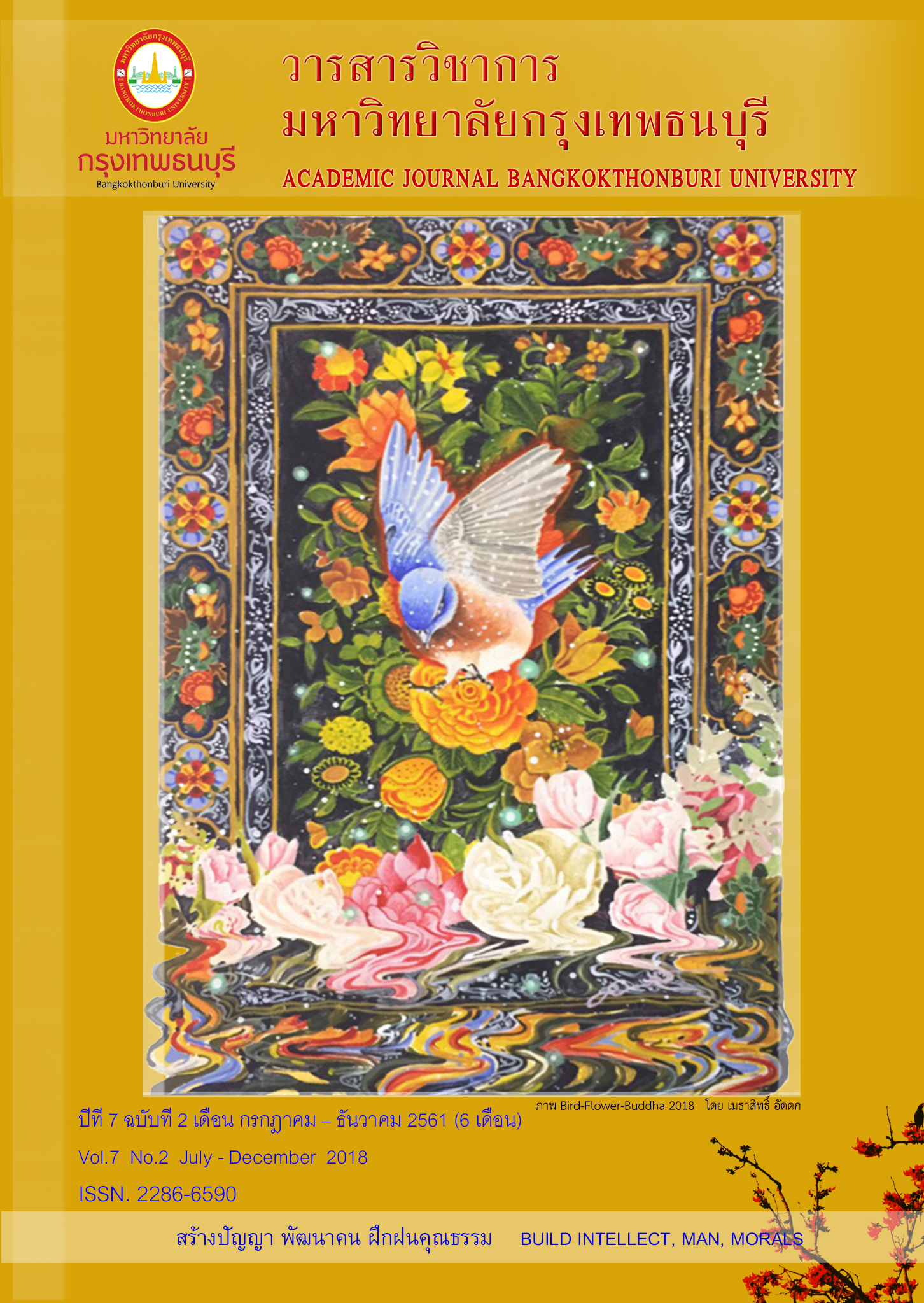The Development of Instructional Model based on Constructivism and Connectivism to Create Innovation in Real World Experience
Main Article Content
Abstract
The purposes of this research were to: (1) analysis and synthesis conceptual of Instructional Model based on constructivism and connectivism to create Innovation in real world experience (2) to develop the Instructional Model and (3) to study the effects of implementing the develop instructional model. The research procedure comprised (1) to analyze and synthesize of instructional model , (2) to develop of instructional model, (3) Assessment forms created by a proper assessment of the model through the consensus of experts from five people, (4) implementation of revised recommendations and to assess the suitability of the instructional model by the six experts and (5) to study the results of usng the model. The samples used for experiment were undergraduate students from Faculry of Science and Technology, Phetchaburi Rajabhat University, the probability evaluated from a simple random sampling with learn subject in Learning Management in Computer courses and Object Oriented Programming Principles courses were 125 students. The research results indicated that: (1) The instructional model based on constructivism and connectivism to create Innovation in real world experience was called “C2I Model” which is consisted as follows: Connectivism, Constructivism and Innovation in the real world. (2) The main conclusion drawn from this study is that the experts agreed with the objective of this study which aimed at designing and developing the C2I model. The overall mean of their opinions was high level ( = 4.43, S.D = 0.42), which means that they strongly agreed with the quality of this instructional model. (3) The experimental results of using an experiential students satisfaction was at a high level (
= 4.27, S.D = 0.41) in overall. Moreover, both subjects score of satisfaction with Learning Management in Computer courses and Object Oriented Programming Principles courses was not different.
Article Details
References
Schmidt, R., Möhring, M., Härting, R. C., Reichstein, C., Neumaier, P., & Jozinović, P. (2015, June). Industry 4.0-potentials for creating smart products: empirical research results. In International Conference on Business Information Systems (pp. 16-27). Springer International Publishing.
Siemens, G. (2005). Connectivism: A learning theory for the digital age,” In International of Instructional Technology and Distance Learning. 2(1) : 3-10.
ไพฑูรย์ สินลารัตน์ (2558) ปรัชญาการศึกษาเชิงสร้างสรรค์และผลิตภาพ. จุฬาลงกรณ์มหาวิทยาลัย กรุงเทพฯ
ณมน จีรังสุวรรณ. (2558). หลักการออกแบบและประเมิน. กรุงเทพฯ: ศูนย์ผลิตตำราเรียนมหาวิทยาลัยเทคโนโลยีพระจอมเกล้าพระนครเหนือ
ดร.เกียรติอนันต์ ล้วนแก้ว (2559). เมื่อ Thailand 4.0 ถูกขับเคลื่อนด้วย Education2.0. วารสารสานปัญญา ฉบับที่ 26
ดร.สุวิทย์ เมษินทรีย์. [ออนไลน์]. แนวคิดเกี่ยวกับประเทศไทย 4.0 . [สืบค้นเมื่อ 28 สิงหาคม 2559]. เว็บไซต์https://planning2.mju.ac.th/goverment/20111119104835_planning/Doc_25590823143652_358135.pdf
บุปผชาติ ทัฬหิกรณ์. (2555). รายงานการวิจัย เรื่อง การพัฒนาคุณลักษณะผู้เรียนยุคใหม่เพื่อรองรับการปฏิรูปการศึกษาในทศวรรษที่สอง ด้วยการบูรณาการไอซีทีในการจัดการเรียนรู้ด้วยโครงการ.กรุงเทพมหานคร : สำนักงานเลขาธิการสภาการศึกษา กระทรวงศึกษาธิการ.
วาสนา สังข์พุ่ม. (2554). “รูปแบบการจัดการเรียนการสอนตามแนวทฤษฎีเชื่อมโยงนิยม” วารสารการอาชีวะและเทคนิคศึกษา. 1 (2) กรกฎาคม-ธันวาคม 2554
สนิท สิทธิ. (2557). รูปแบบการสอนผ่านเว็บตามทฤษฎการเรียนรู้คอนเน็ตติวิซึมเพื่อการสร้างเสริมทักษะการแก้ปัญหาด้านเทคโนโลยีสารสนเทศและการสื่อสารสำหรับนักศึกษาระดับอุดมศึกษา. ศึกษาศาสตรดุษฎีบัณฑิต สาขาเทคโนโลยีการศึกษา มหาวิทยาลัยเกษตรศาสตร์.
สำนักวิชาการ สำนักงานเลขาธิการสภาผู้แทนราษฏร [ออนไลน์] ประเทศไทย 4.0 เอกสารวิชาการ [สืบค้นเมื่อ 28 สิงหาคม 2559] จาก https://www.parliament.go.th/library
อมรา อิทธิพ.ษ์ (2556) อิทธิพลของสื่อการสอนแบบ Cyber Lab ที่มีผลต่อมโนทัศน์ที่เปลี่ยนไปของการ เรียนรู้จากการใช้เครื่องมือปฏิบัติการทางฟิสิกส์: กรณีศึกษาสำหรับนักศึกษาที่ ลงทะเบียนเรียนวิชาปฏิบัติการฟิสิกส์พื้นฐาน คณะวิทยาศาสตร์และเทคโนโลยี มหาวิทยาลัยราชภัฎสวนสุนันทา. รายงานวิจัยมหาวิทยาลัยราชภัฏสวนสุนันทา คณะวิทยาศาสตร์และเทคโนโลยี

